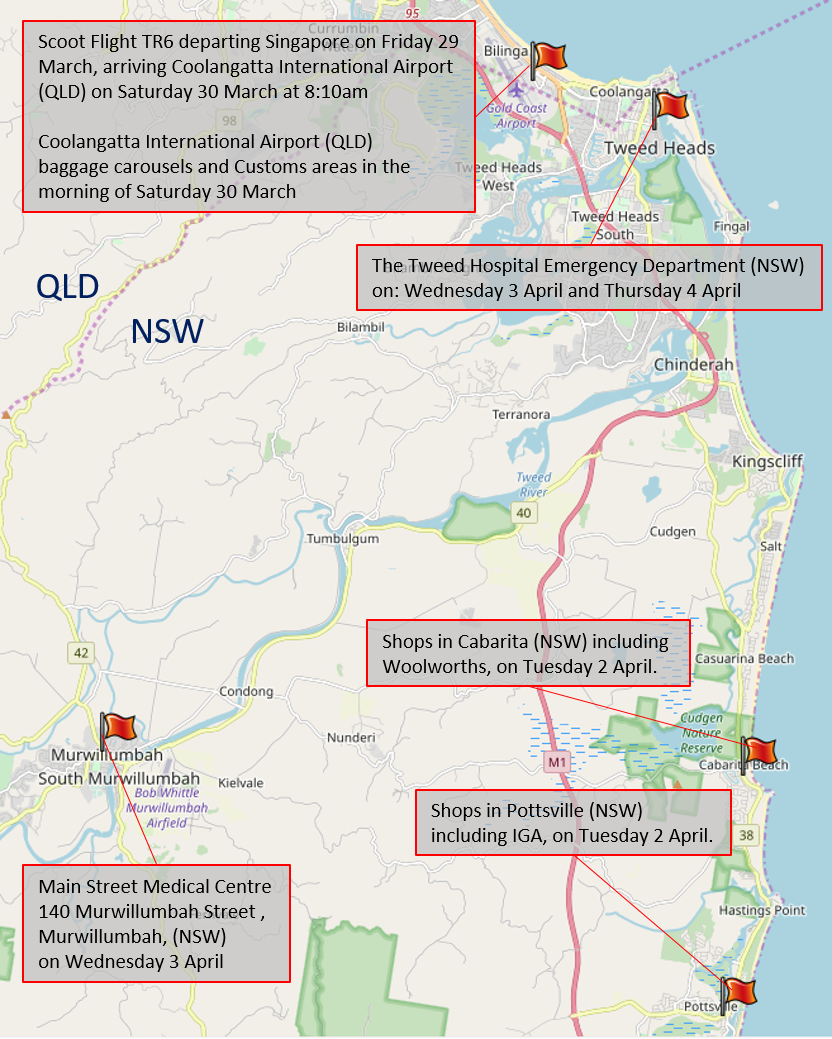NSW Health is continuing to urge people to make sure they are vaccinated against measles, particularly prior to travel, after two young adults were infected whilst visiting the Philippines, where a large outbreak is currently occurring.
The two siblings who were unvaccinated, became unwell just prior to returning to Australia, and were infectious on their return flight from Singapore to Coolangatta (Gold Coast) International Airport (QLD). While infectious, the siblings spent time in a number of Northern NSW locations.
People in the same places at the same time as the two young adults, should be alert for signs and symptoms of measles until 22 April as it can take up to 18 days for symptoms to appear. The details of the exposure sites are provided in the map and table below.
Measles is a serious viral illness, spread easily through the air when an infectious person coughs, sneezes or breathes. Symptoms usually begin with a cough, runny nose, and/or conjunctivitis, as well as fever. This is followed 3 to 4 days later by a red, spotty, non-itchy rash which usually starts on the head and neck and moves down onto the trunk and limbs.
Two doses of measles vaccine provides lifelong protection to 99% of vaccinated people. NSW Health encourages all people born during or after 1966 to ensure they have received two doses of measles vaccine.
The measles vaccine is offered to children in Australia at 12 and 18 months of age, as part of the National Immunisation Schedule. The vaccine is available for free from GPs in NSW for anyone born during or after 1966, who does not have evidence of measles immunity. Selected pharmacies in NSW can also provide measles vaccine.
More information about measles is available below, or on the measles webpage.
Scoot Flight TR6, The Tweed Hospital, Cabarita, Pottsville, and Murwillumbah Saturday 30 March to Thursday 4 April 2019

Map created using Arc GIS Portal (Sources: Esri, OpenStreetMap contributors, CC-BY-SA)
Friday 29 March to Saturday 30 March 2019 |
Scoot Flight TR6 from Singapore to Coolangatta Airport, departing Singapore on Friday (night) 29 March, arriving Coolangatta International Airport (QLD) at 8:10am on Saturday 30 March |
|---|
| Saturday 30 March 2019 |
Coolangatta International Airport (QLD), including baggage carousels and Customs, in the morning. |
|---|
| Tuesday 2 April 2019 |
Shops in Cabarita (NSW), including Woolworths
Shops in Pottsville (NSW), including IGA |
|---|
| Wednesday 3 April 2019 |
Main Street Medical Centre, 140 Murwillumbah Street Murwillumbah (NSW)
The Tweed Hospital, Powell Street and Florence Street, Tweed Heads (NSW) |
|---|
| Thursday 4 April 2019 |
The Tweed Hospital, Powell Street and Florence Street, Tweed Heads (NSW) |
|---|
These sites pose no ongoing risk to the public.
The local Public Health Unit is working with the Hospital, and Medical Centre to directly contact patients present at the same tiem as the two young adults.
Measles is a highly contagious viral illness, which is spread easily through the air when an infectious person coughs, sneezes or breathes. The measles virus can remain in the air for short periods of time, so simply being in the same room as a person with measles can result in infection if you are not immune.
Measles generally begins with a fever, cough, runny nose and/or sore, red eyes, followed a few days later by a red, spotty, non-itchy rash which starts on the face and spreads to the body and limbs. People with measles may also experience diarrhoea and this is more common in small children.
People who are experiencing signs and symptoms of measles should seek medical attention. NSW Health recommends calling ahead to the practice or emergency department to alert of them of your symptoms so that measures can be taken to limit your exposure to others upon your arrival.
Measles is a serious illness, and complications such as diarrhoea, middle ear infection and pneumonia occur in up to one third of cases. Measles encephalitis is swelling of the brain caused by the measles virus and occurs in up to one in 1000 cases. A fatal condition known as sub-acute sclerosing pan encephalitis occurs in 1 in 10000 cases and is a progressive neurological disorder which presents years after measles infection.
People are at risk of measles if they are exposed to an infectious case and have never had measles or have not received two doses of measles containing vaccine. Two doses of measles containing vaccine provide lifelong protection against infection in 99 per cent of vaccinated people. People born before 1966 are assumed to be immune to measles.
NSW Health encourages all people 12 months of age or older, and born during or after 1966 make sure they have received two doses of measles vaccine. For people who are unsure of whether they have previously received two doses, it is safe to receive more than two.
Travellers are encouraged to discuss their travel plans with their GP to ensure that they are protected against preventable diseases such as measles prior to travel. People travelling with children between the ages of 9 months and 18 months of age should discuss travel plans with their doctor, as the vaccination schedule can be adjusted for children travelling to high risk areas for measles.

